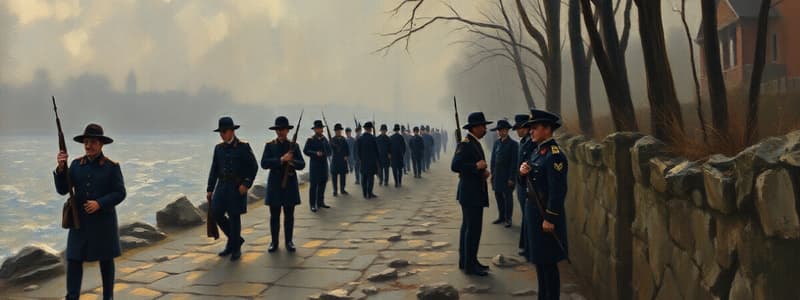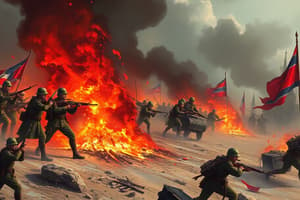Podcast
Questions and Answers
What is the definition of 'Total War'?
What is the definition of 'Total War'?
- A war that restricts military engagement to specific regions.
- A war fought only on the battlefield with conventional tactics.
- A war solely between military personnel without civilian involvement.
- A war involving complete mobilization of a nation's resources and affecting all aspects of civilian life. (correct)
Which nations formed the Central Powers during World War I?
Which nations formed the Central Powers during World War I?
- Britain, France, Japan, and the United States.
- Germany, Italy, and Japan.
- Germany, France, Russia, and Italy.
- Germany, Austria-Hungary, the Ottoman Empire, and Bulgaria. (correct)
What was the primary strategy of the Schlieffen Plan?
What was the primary strategy of the Schlieffen Plan?
- To conduct guerrilla warfare in Eastern Europe.
- To invade France through Belgium and avoid a two-front war. (correct)
- To create alliances with neutral countries.
- To establish a naval blockade against Britain.
What was the purpose of the October Manifesto?
What was the purpose of the October Manifesto?
What was the main outcome of the Zimmerman Telegram?
What was the main outcome of the Zimmerman Telegram?
What was Trench Warfare primarily characterized by?
What was Trench Warfare primarily characterized by?
What was the Duma's role in early 20th century Russia?
What was the Duma's role in early 20th century Russia?
What does the term 'Armed Peace' refer to?
What does the term 'Armed Peace' refer to?
What was the outcome of the Treaty of Brest-Litovsk?
What was the outcome of the Treaty of Brest-Litovsk?
Which battle is known for leading to a stalemate and trench warfare in WWI?
Which battle is known for leading to a stalemate and trench warfare in WWI?
What event was a significant precursor to the Russian Revolution of 1905?
What event was a significant precursor to the Russian Revolution of 1905?
What was a major feature of the Bolshevik economic policy during the Civil War?
What was a major feature of the Bolshevik economic policy during the Civil War?
Which faction opposed the Bolsheviks and favored gradual reforms?
Which faction opposed the Bolsheviks and favored gradual reforms?
Which battle is characterized by the introduction of tanks by the British?
Which battle is characterized by the introduction of tanks by the British?
What did the Revolution of February 1917 lead to in Russia?
What did the Revolution of February 1917 lead to in Russia?
What was a key characteristic of the Red Army in the Russian Civil War?
What was a key characteristic of the Red Army in the Russian Civil War?
Flashcards
Armed Peace
Armed Peace
A time of military buildup without open conflict using deterrence to stay stable.
Arms Race
Arms Race
Competition between countries to build superior military power, usually leading to more tension.
Total War
Total War
A war needing all a nation's resources, impacting everyone.
Submarine Warfare
Submarine Warfare
Signup and view all the flashcards
Schlieffen Plan
Schlieffen Plan
Signup and view all the flashcards
Trench Warfare
Trench Warfare
Signup and view all the flashcards
Central Powers
Central Powers
Signup and view all the flashcards
Allies
Allies
Signup and view all the flashcards
Treaty of Brest-Litovsk
Treaty of Brest-Litovsk
Signup and view all the flashcards
Battle of the Marne
Battle of the Marne
Signup and view all the flashcards
Bolsheviks
Bolsheviks
Signup and view all the flashcards
Revolution of October
Revolution of October
Signup and view all the flashcards
Revolution of February
Revolution of February
Signup and view all the flashcards
Russo-Japanese War
Russo-Japanese War
Signup and view all the flashcards
Lusitania Sank
Lusitania Sank
Signup and view all the flashcards
War Communism
War Communism
Signup and view all the flashcards
Study Notes
Key Concepts in World War I and the Russian Revolution
- Armed Peace: A period of high military readiness, but avoided open conflict through deterrence.
- Arms Race: A competition among nations to build superior military forces, often escalating tensions.
- Total War: A conflict that fully mobilizes a nation's resources, impacting all aspects of civilian life.
- Submarine Warfare: The use of submarines to attack enemy shipping, such as Germany's unrestricted U-boat campaign in WWI.
- Trench Warfare: A defensive tactic in WWI characterized by extended trench systems, leading to stalemates.
- Duma: The Russian parliament established after the 1905 revolution, providing limited representation.
- Alsace-Lorraine: Regions disputed between France and Germany, returned to France after WWI.
- Soviets: Workers' councils in revolutionary Russia, playing a vital role in the 1917 revolutions.
- The Eastern Question: A complex diplomatic issue concerning the decline of the Ottoman Empire and European interests.
- The Schlieffen Plan: Germany's strategy in WWI to quickly defeat France by attacking through Belgium, aiming for a swift victory.
- Gallipoli/Dardanelles: A failed Allied campaign during WWI to secure a sea route to Russia through Ottoman-controlled waters.
- Zimmerman Telegram: A secret German proposal offering support for Mexican territorial gains to draw the US into WWI.
- October Manifesto: A 1905 decree by Tsar Nicholas II, granting civil liberties and establishing the Duma.
- Council of People's Commissars: The executive body of the Soviet government after the October Revolution, led by Lenin.
- Armistice: A formal agreement to stop fighting; the WWI Armistice was signed on November 11, 1918.
Alliances and Conflicts
- Central Powers: Germany, Austria-Hungary, Ottoman Empire, and Bulgaria formed the Central Powers during WWI.
- Allied Powers: France, Britain, Russia (later the US, Italy) formed the Allied Powers in WWI.
- Triple Alliance: A pre-WWI military agreement among Germany, Austria-Hungary, and Italy.
- Triple Entente: A pre-WWI alliance of France, Britain, and Russia, opposing the Triple Alliance.
- Treaty of Brest-Litovsk: A peace treaty in 1918 between Soviet Russia and the Central Powers, ending Russia's involvement in WWI.
Key Battles and Events
- Battle of Marne: A decisive WWI battle in 1914, where Allied forces halted the German advance.
- Battle of Verdun: A brutal and costly WWI battle between France and Germany.
- Battle of Tannenberg: A significant German victory against Russia in WWI, highlighting German military strength on the Eastern Front.
- Battle of Somme: A WWI battle known for high casualties and the introduction of tanks by the British.
- Balkan Wars: Two conflicts involving Balkan states fighting the Ottoman Empire, and then each other.
- Lusitania Sinking: A British passenger ship sunk by a German U-boat, contributing to US entry into WWI.
- Bloody Sunday (Russia): A massacre of peaceful protesters by the Tsar's troops, sparking the 1905 revolution.
- April Theses: Lenin's policy directives advocating for Soviet rule and ending Russia's war involvement.
- Algeciras Conference: A 1906 conference attempting to resolve the First Moroccan Crisis.
Revolutions and Political Groups
- Revolution of February: The 1917 Russian uprising leading to Tsar Nicholas II's abdication.
- Revolution of October: The 1917 Bolshevik-led revolution establishing the Soviet regime.
- Bolsheviks: The radical socialist faction led by Lenin, seizing power in the October Revolution.
- White Army: The anti-Bolshevik forces during the Russian Civil War.
- Mensheviks: A faction of the Russian socialist movement opposing the Bolsheviks.
- Communist Party (Russia): The Bolshevik party establishing and leading the Soviet Union.
- Red Army: The military force of Soviet Russia, formed by the Bolsheviks during the Russian Civil War.
- War Communism: The Bolshevik economic policy during the Russian Civil War, involving state control of resources.
- Red Guards: Bolshevik paramilitary forces instrumental in the October Revolution.
Studying That Suits You
Use AI to generate personalized quizzes and flashcards to suit your learning preferences.
Description
Test your knowledge on pivotal concepts from World War I and the Russian Revolution. This quiz covers key terms such as armed peace, total war, and submarine warfare, as well as the roles of the Duma and Soviets. Enhance your understanding of the historical context and impact of these events through engaging questions.




